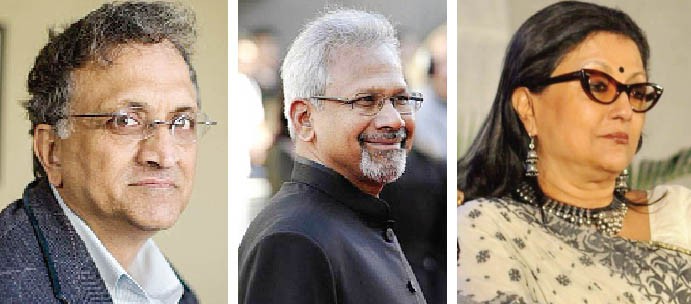
The plight of writers in India have gotten worse under the Modi government

The further a society drifts from truth, the more it will hate those who speak it.
- George Orwell
I’ll begin with an old joke that might seem rather uncouth to some. Nonetheless, it is an interesting one. Three dogs, belonging to three different countries - Russia, India and Pakistan - meet at a crossroads .During the course of conversation they find themselves telling the other two about the conditions in their respective homelands.
‘Well well, we have enough to eat’, says the one that belonged to Russia, ‘but there’s no right to bark’. To which, the one that came from India says: ‘We, on the contrary, have almost nothing to eat, but we can bark to our heart’s content’. ‘Neither food nor the right to bark!’, says the one from Pakistan.
Things have changed somewhat for Pakistan since then -as far as the second complaint goes. India’s economic situation too is a tad better now, but it seems that its people can’t exercise the second right as freely as they once could. Often the most cherished of all rights in a democratic set-up, is the freedom of speech.
It seems that speaking one’s mind is no longer easy in India- especially when it is about questioning the policies and agenda of the government. The Indian media have either hushed up or metamorphosed into a mouthpiece of the government. They mostly work as unofficial agents and promoters of the BJP/RSS propaganda brigades. Cultural communicators: writers, artists, painters etc. too have, to bear the brunt of strict government policies.
In October, an FIR was lodged against as many as 50 writers, filmmakers and other artists in India. The list included names like Ramchandra Guha, Mani Ratnam and Aparna Sen, who had written an open letter to Prime Minister Narendra Modi, raising concern over the growing incidents of mob lynching in the country. According to the Indian police: ‘The FIR was lodged under several sections of the Indian Penal Code, including those relating to sedition, public nuisance, hurting religious feelings and insulting with intent to provoke breach of peace.’
With an ultra-right-wing political party in power, the velocity and volume, with which India’s ideological regimes are out to disseminate and penetrate into the democratic fabric of the country, is mind-boggling. The agenda of these regimes is not confined to modifying the political culture. It is aimed at reworking and remodelling it. This idea is diametrically different from the secular vision enshrined in the Indian constitution. A juggernaut of manipulation is at work to achieve the target. Again, it is not limited to the political arena; it is clearly and rapidly encompassing almost every sphere of Indian society.
Tampering with history, changing the curriculum to include an exclusivist ideology, popularising culture of a hate aiming at the perpetual othering and eventual annihilation of people of lesser social significance is the order of the day. It is not only an idea; this slow manipulation is concrete and cruel manifestations of it are to be seen in everyday public life.
The lay citizen in India - if not belonging to the majority Hindu faith - is inherently at risk of being persecuted by religious fanatics (for whatever reason) and when that happens, the State conveniently looks the other way. A whole nation has been stifled and caged by being denied their fundamental right to self-determination.
Back in 2015, Indian writers had registered their protest during a somewhat similar situation. Several of them had relinquished awards from one of the country’s top literary institutions, in a symbolic show of protest against the growing disregard for freedom of speech under the Modi government. The second stint of the BJP government seems to be even worse. Is it not time that Indian writers built a fresh momentum and went beyond symbolic gestures of solidarity? Surely, the risks involved are great, but the responsibility they are supposed to shoulder is greater.
Indian writers have been through such ordeals before. Though the situation didn’t last for long, post-partition India was a bleak place for writers, which many Indian writers faced bravely.
Writers in Pakistan have also experienced dark times in terms of freedom of speech - not only under military regimes but also during the tenures of the so-called democratically elected governments. But they have always spoken up for their rights. Admittedly, there were some compromises here and there, with the autocratic and suppressive regimes, but a large number of poets and short story writers braved the undemocratic and tyrannical policies of successive governments.
Writers and journalists were put behind bars, forced into exile, even flogged in public. Habib Jalib was once brutally beaten by baton-wielding police. But the important thing is that they never budged. Writers in Pakistan are still writing on sensitive issues - including violations of human rights in Balochistan - knowing fully well who they’re up against.
Indian literature, written in its various vibrant languages, has been known for its social concern and political themes. Having an enviably glorious history of resistance and protest, this literature has fought hard but quite effectively against the narrow and inhuman confines of caste and class as well as against the gender-discriminating mindset.
The situation is much more complex in India currently as the incumbent regime is moving forward with repressive state apparatus.
It is now for the Indian writers to stand up to oppression and show on which side they are - with the exacting ‘ideology’ or with humanity in general. It is still to be seen whether they stay mum, resort to the convenient strategies like mincing their words and indulging in symbolism; or decide to simply speak their truth.